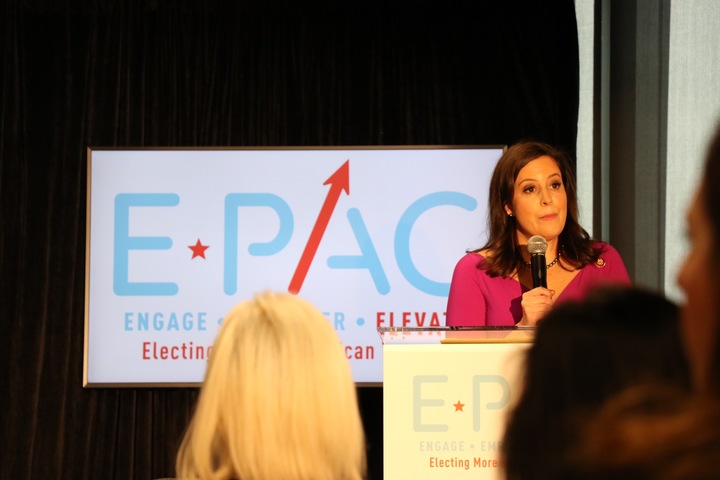WASHINGTON — With only 13 women Republicans in the House compared with 89 Democratic women, the GOP House leadership Thursday backed the launch of E-PAC, a political action committee created by GOP Rep. Elise Stefanik dedicated to elect more Republican women to Congress.
Republican leadership — including House Minority Leader Kevin McCarthy, Republican Conference Chairwoman Liz Cheney and National Republican Congressional Committee Chairman Tom Emmer — joined forces with the 34-year-old New York congresswoman to kick off the new political action committee.
Republican women lost 10 seats in the House of Representatives in the November elections, dropping the total of 13 to their lowest number in a quarter-century. The number of Democratic women, on the other hand, is now the highest it’s ever been.
E-PAC is Stefanik’s brain child, an idea she had because she realized the Republican party “is not reflective of the American public.” To combat this, she said, E-PAC will begin pouring money into female Republican candidates’ campaigns beginning before the 2020 primaries.
“We must do better and we do not need permission to tackle this issue,” Stefanik said, firing back at previous criticism from Emmer, who had called the idea a “mistake.”
Stefanik said she set an initial fundraising goal of $100,000 for E-PAC. In just two weeks, she said, the PAC has raised over $250,000.
Melissa Miller, the deputy communications director for the DCCC, does not think Stefanik’s new efforts will bear fruit based on Republican women’s lack of success in the 2018 elections.
“Rep. Stefanik talked a big game about recruiting women candidates in 2017, yet this year’s freshman class put the number of Republican women in the House at a quarter-century low,” Miller said. “Her 2020 efforts are sure to be just as effective since voters know that Democrats are the ones looking out for health care and economic security for women and working families.”
Emmer noted that as the recruitment chair for the NRCC, Stefanik recruited over 50 female GOP candidates, but only one non-incumbent candidate was able to win her district.
For these candidates to win in the future, Emmer said, they not only need the financial resources, but they need passion for the issues and their party.
“If you’ve never (run before), that’s not a reason not to do it,” he said. “That’s not a reason not to take the risk. Because if you’ve got the fire, you’ve got friends that will help.”
With these new candidates, Emmer said, the Republican Party may be able to attract the key demographic it lost in the midterm elections — educated white suburban females.
Rep. Susan Brooks, R-Ind., said many women feel that they need to be asked to run and E-PAC can be proactive in targeting potential candidates and urging them to run. The PAC could also help with the timing of women’s campaigns, Rep. Jamie Herrera Beutler, R-Wash., noted, saying she always knew she would run, but needed help figuring out when.
The Republicans said Democratic women’s greater numbers need to be balanced by GOP voices.
“We need to be at the table otherwise there’s going to be people on the other side of the aisle—we see where some of the policies are going,” Beutler said. “It’s not going to help our members. It’s not going to help our economy. It’s not going to help liberty. It’s not going to help women raise their kids.”
Congresswoman Brooks, who just finished up her time as co-chair of the Congressional Caucus on Women’s Issues, said a lot of Democratic women she works with would like to see more Republican women in Congress. Through the E-PAC, Brooks hopes Republican women can bolster their numbers, because the relationships Congresswomen create through the Women’s Caucus would be even stronger if there were more of them, she said.
Most importantly, Brooks said she wants the PAC to raise the profile of Republican women.
“This way, we can get Republican women to see us as role models and know we’re here to help them,” Brooks said.


